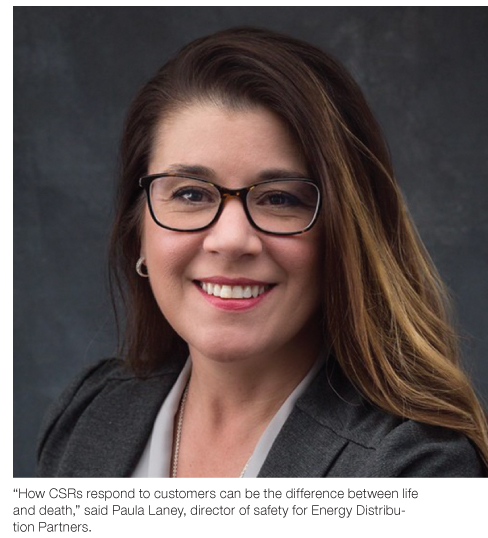
“There are some in propane who believe that training only needs to be given to people who handle propane, but what about people who handle people?” In the June webinar series hosted by Virtual Propane Expo (VPE), Paula Laney, director of safety for Energy Distribution Partners (EDP; Chicago), discussed the important role customer service representatives (CSRs) play in the propane industry. Her webinar was titled, “5 Critical CSR Mistakes Every Propane Company Makes and How to Fix It.”
Laney listed five common mistakes a CSR can make:
- Making assumptions about the caller’s situation before getting all the facts.
- Failing to treat an emergency or priority call as an emergency.
- Not remaining calm during emergency calls and not delivering the necessary and complete safety message to the customer.
- Being an “order taker” rather than taking the time to understand the needs or situation of the customer.
- Avoiding or ignoring opportunities to learn more about propane and propane applications that could benefit their customers.
Laney grew up in her family’s retail propane business, Liberty Propane Gas (Cookson, Okla.), working in many roles. She then spent nearly 20 years as director of safety, education, and training for the Oklahoma LP Gas Research, Marketing and Safety Commission before moving to her current role with EDP.
“Every employee plays a role in safety,” Laney said on the webinar. “How CSRs respond to customers can be the difference between life and death.”
“CSRs are the first line of communication with customers and it is very important that they give customers the correct and complete information they need quickly,” she explained. A common example is the customer who calls and says, “I smell gas.” The CSR should never tell the customer not to worry, according to Laney, as this might give a false sense that everything is okay. “The customer should be instructed to evacuate the house or facility until it has been checked out by a professional and the situation is remedied.”
Laney commented that often propane middle managers and field managers “retrain” CSRs to cut corners in handling concerned customers to not disrupt their workflow. “Propane company owners need to make sure this is not allowed to happen by having all staff members fully understand company protocols for handling customer safety matters and the dangers that could ensue when shortcuts are taken.”
“It is important that a CSR be able to handle an urgent safety concern and not have to have the customer wait for a higher level manager to return a call,” she said. “Also, telling a customer to ‘just Google it’ is never a good idea. It is a red flag that a company is not safety-focused or prepared.”
In a discussion with BPN after the webinar, Laney estimated the likely percentage of companies training CSRs effectively across the retail propane industry. “Just five years ago I would have said maybe 20% of propane companies were investing in training their CSRs adequately. This need has been championed by me and many others such as John Hansen, Mike Walters, Eric Kuster, and Stuart Flatow, and it has gained a lot of ground.”
“There is a growing awareness in our industry of how critical a CSR is to the handling of priority calls. The Propane Education & Research Council (PERC) has a new Office Personnel: Safety and Sales for Customer Service Representatives training course now in the Learning Center that makes this training more accessible than ever before. By the end of the summer, I think the number of propane companies that are adequately training their CSRs will be closer to 50% to 60%. Internally here at EDP, employee training is a priority and we require all CSRs to complete PERC’s Office Personnel course as part of the onboarding/training process and before they take customer calls unsupervised.”
“Small independents are not as likely to have a formal, documented process, but the majors most definitely do,” Laney said. “I think that’s beginning to change as well as training resources become more accessible and more task-based and as more authorities having jurisdiction require it.”
Kelsey Bright, director of customer service at ThompsonGas, agrees that training customer service representatives in all aspects of safety is critical. “We have a variety of regular training classes for our CSRs on handling emergency calls. It is so important that we not become complacent,” Bright told BPN. “It has been important that customers have had a way to stay in touch with us on all concerns during the pandemic.”
“One of the most difficult things to get across is why we have and use a scripted safety message on priority calls,” Laney explained. “Some of the best CSRs are friendly and personable. They know their customers and take care of them, so a scripted message seems unnatural and robotic. That’s why it’s essential to practice these calls and reinforce the importance of providing the entire safety message.” — Pat Thornton


